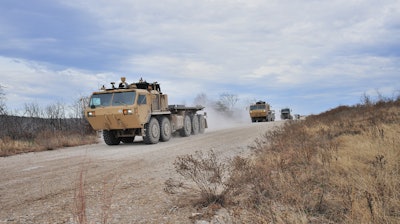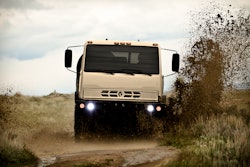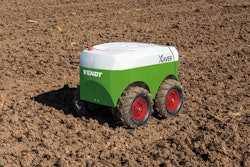
Lockheed Martin's Autonomous Mobility Applique System (AMAS) logged more than 55,000 testing miles during the U.S. Army Extended Warfighter Experiment (EWE) at Fort Leonard Wood, MO, and Fort Bliss, TX.
"The testing was conducted by Soldiers and Lockheed Martin personnel over several months at two major military installations in a variety of mission scenarios," says Kathryn Hasse, Combat Maneuver Systems Director at Lockheed Martin Missiles and Fire Control. "Soldiers operating the AMAS vehicles provided us very positive feedback about how the system freed them up to do the job of a Soldier instead of the job of a truck driver."
AMAS is an applique kit comprising sensors, actuators and controls that can be installed on virtually any military tactical wheeled vehicle. AMAS provides driver warning/driver assist and semi-autonomous leader/follower capability, significantly increasing safe convoy operations for military vehicles. The system reduces manpower needs for convoy operations, freeing Soldiers up for other tasks and removing them from exposure to Improvised Explosive Devices (IEDs) and other enemy activity while on resupply missions.
The EWE was sponsored by the U.S. Army Training and Doctrine Command (TRADOC) and managed by the U.S. Army Tank Automotive Research Development and Engineering Center (TARDEC).
Testing of the AMAS system during the EWE included using Palletized Loading System vehicle convoys in which the lead vehicle was driven by a Soldier and the following vehicles (three to four) followed robotically.
"AMAS continues to prove itself as a valuable asset for our military by safely operating in complex environments," Hasse says. "We believe that AMAS is ready to move forward toward the ultimate goal of widespread fielding across multiple military applications."



















